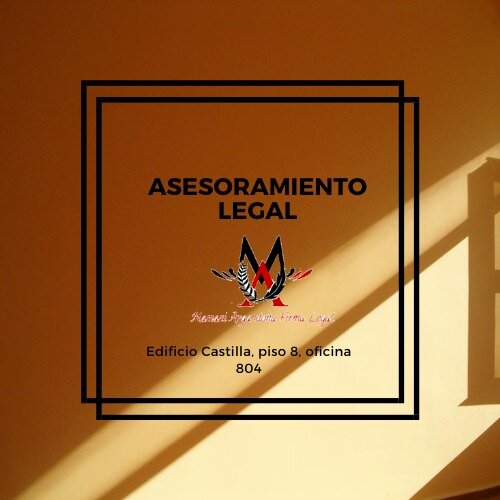Best Restructuring & Insolvency Lawyers in La Paz
Share your needs with us, get contacted by law firms.
Free. Takes 2 min.
List of the best lawyers in La Paz, Bolivia
About Restructuring & Insolvency Law in La Paz, Bolivia
Restructuring and insolvency law in La Paz, Bolivia provides a legal framework for companies, entrepreneurs, and individuals facing financial difficulties. The main objective is to allow viable businesses to restructure their obligations and operations to avoid bankruptcy, or to facilitate an orderly liquidation when financial recovery is impossible. These laws balance the rights of debtors and creditors, aiming to preserve economic activity and maximize asset value for all involved parties. This practice area is often complex, involving various legal, commercial, and financial considerations unique to Bolivian law and business culture.
Why You May Need a Lawyer
Facing financial distress, either as an individual or a business, can be overwhelming. Legal guidance is essential in several situations, including:
- Navigating complex insolvency procedures defined by Bolivian law
- Negotiating with creditors for restructuring debts
- Defending against claims from suppliers, employees, or tax authorities
- Filing for judicial reorganization or bankruptcy
- Assisting with asset protection strategies
- Understanding your rights and obligations during insolvency
- Helping creditors recover outstanding debts from insolvent debtors
A lawyer specializing in restructuring and insolvency can provide tailored advice, help ensure compliance with local regulations, and represent your interests before courts and administrative bodies.
Local Laws Overview
Bolivia's laws regarding restructuring and insolvency are principally found in the Commercial Code (Código de Comercio) and supplementary laws addressing bankruptcy (quiebra) and creditor arrangements (concordato preventivo). Key aspects include:
- Concordato Preventivo: A legal arrangement enabling a debtor to propose a plan to restructure debts and continue operations under court supervision. Approval from creditors and the court is required.
- Bankruptcy Proceedings (Quiebra): Triggered when a company or individual is unable to meet financial obligations. The process involves liquidation of assets to pay creditors according to a legally prescribed order.
- Role of Trustees (Síndicos): Appointed by the court, trustees oversee asset management and distribution among creditors.
- Creditors’ Rights: Secured creditors, employees, and tax authorities have priority in the distribution of assets.
- Fraudulent Conveyance: The law includes provisions to reverse transfers made to defraud creditors before insolvency is declared.
- Local Jurisdiction: Insolvency and restructuring matters in La Paz fall under the local commercial courts, which have exclusive jurisdiction in these cases.
It's important to note that Bolivian insolvency law is formalistic and timelines are strictly enforced, making professional legal assistance invaluable.
Frequently Asked Questions
What is the difference between restructuring and bankruptcy in Bolivia?
Restructuring involves negotiating new payment terms with creditors, typically through a concordato preventivo, to allow a business to remain operational. Bankruptcy, or quiebra, is the legal process of liquidating assets when a debtor can no longer meet obligations.
Who can initiate restructuring or insolvency proceedings?
Both debtors and creditors can initiate these proceedings. A debtor may proactively seek restructuring, while creditors may file for bankruptcy if debts remain unpaid.
How long do restructuring or bankruptcy processes usually take?
The duration varies depending on the complexity of the case, the cooperation of all parties, and court workload. Procedures can range from several months to a few years.
Can I keep my business running during restructuring?
In most cases, yes. A business undergoing restructuring may continue its operations under court supervision until a plan is confirmed or rejected.
What happens to my employees if I file for insolvency?
Employee claims are granted special priority under Bolivian law. In restructuring, jobs may be preserved. In bankruptcy, employees typically receive outstanding wages before other creditors.
Will I lose all my assets if I go bankrupt?
Not necessarily. Certain assets may be protected by law as essential or exempt from liquidation. However, most non-exempt assets are sold to pay creditors in a bankruptcy process.
Can foreign companies or creditors participate in Bolivian insolvency proceedings?
Yes, foreign entities may participate but must comply with local procedural rules. Recognition of foreign court decisions is subject to Bolivian legal requirements.
How are creditors paid in insolvency?
Payments follow a strict legal order: secured creditors, employees, tax authorities, and finally unsecured creditors. The court oversees the payment process.
Is it possible to reverse asset transfers made before insolvency?
Yes, transfers intended to defraud creditors or made within a specified period prior to insolvency can be reversed by court order.
Do I always need a lawyer to file for restructuring or bankruptcy?
While it is possible to represent oneself, the complexity of Bolivian law and court procedures make hiring a lawyer highly advisable for the best outcome.
Additional Resources
If you require more information or assistance, the following resources can be helpful:
- Chamber of Commerce of La Paz (Cámara de Comercio de La Paz): Offers support for businesses and can direct you to qualified professionals.
- Commercial Courts of La Paz (Juzgados Comerciales): These courts handle restructuring and insolvency matters.
- Ministry of Justice and Institutional Transparency (Ministerio de Justicia y Transparencia Institucional): Provides legal information and resources for citizens.
- Bolivian Bar Association (Colegio de Abogados de Bolivia): Directory of licensed lawyers specializing in commercial and insolvency law.
Next Steps
If you are experiencing financial difficulties or facing insolvency in La Paz, Bolivia, consider the following actions:
- Gather all relevant financial documents and records
- Make a list of your assets, liabilities, creditors, and employees
- Consult with a lawyer specializing in restructuring and insolvency to evaluate your situation and discuss your legal options
- Understand your legal rights and obligations under Bolivian law
- Follow your lawyer’s guidance in communicating with creditors and preparing any necessary court filings
- Stay informed about all relevant timelines, as missing legal deadlines could harm your case
Dealing with financial distress or insolvency is challenging, but with the right legal support and a clear understanding of your options, you can navigate this process more effectively and protect your interests in accordance with Bolivian law.
Lawzana helps you find the best lawyers and law firms in La Paz through a curated and pre-screened list of qualified legal professionals. Our platform offers rankings and detailed profiles of attorneys and law firms, allowing you to compare based on practice areas, including Restructuring & Insolvency, experience, and client feedback.
Each profile includes a description of the firm's areas of practice, client reviews, team members and partners, year of establishment, spoken languages, office locations, contact information, social media presence, and any published articles or resources. Most firms on our platform speak English and are experienced in both local and international legal matters.
Get a quote from top-rated law firms in La Paz, Bolivia — quickly, securely, and without unnecessary hassle.
Disclaimer:
The information provided on this page is for general informational purposes only and does not constitute legal advice. While we strive to ensure the accuracy and relevance of the content, legal information may change over time, and interpretations of the law can vary. You should always consult with a qualified legal professional for advice specific to your situation.
We disclaim all liability for actions taken or not taken based on the content of this page. If you believe any information is incorrect or outdated, please contact us, and we will review and update it where appropriate.










